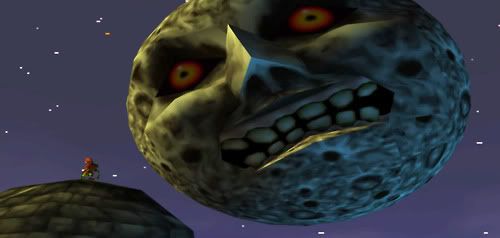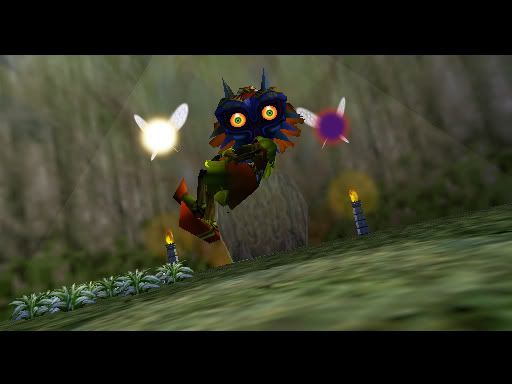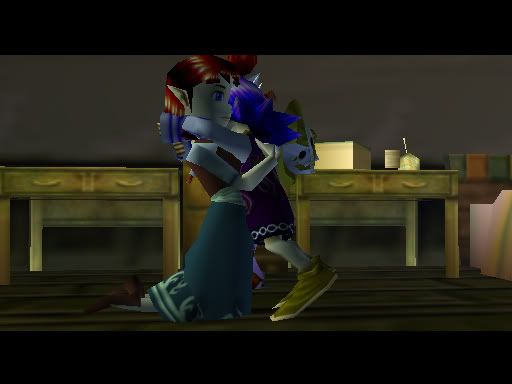This post has not been edited by the GamesBeat staff. Opinions by GamesBeat community writers do not necessarily reflect those of the staff.

This article contains spoilers for The Legend of Zelda: Majora’s Mask.
As Link, you’ve helped Romani Ranch owner Cremia and her energetic little sister Romani through some tough times in the last three days. Looking up in the sky, though, it’s clear to Cremia that she has bigger issues to worry about.
On the eve of the Carnival of Time, the two are milking the cows when Romani informs Link that she finally gets to enjoy the ranch’s signature drink, Chateau Romani.
“Until now, my sister always said, ‘Wait until you're an adult.’ But why now?” Romani asks.
“You've become an adult now, Romani,” Cremia says. “I see it in you. I'm acknowledging it.”
As they finish their work, the siblings head outside, Cremia bidding farewell to Link: “Good night…see you…tomorrow…OK?”
Cremia knows she won’t see you tomorrow, but she stays strong in order to comfort her little sister as the only world they know heads for oblivion overnight.
These little moments define the dark, underrated narrative of 2000’s The Legend of Zelda: Majora’s Mask.
The people you meet during the last three days of their lives bring an incredible normality to what’s usually characterized as an odd entry in the Zelda franchise. Majora’s Mask surrounds itself with some especially alien material (literally), but at its heart, it depicts a very human story and convincing world.
Modern game developers should take note of what Majora’s Mask achieves with its setting and three-day cycle. Post-apocalyptic adventures litter store shelves (Fallout 3, Borderlands, Left 4 Dead), and if a character such as Commander Shepard in Mass Effect is trying to prevent the end of days, they’re pegged as kooky conspiracy theorists.
In Majora’s Mask, the end of the world is a visual entity that hangs in the sky, looming larger and larger every second. People are obviously skeptical of the ominous moon, but by the end of the third day, Clock Town is nearly abandoned. The surreal atmosphere during the final night is something I personally haven’t experienced in any other game. The land of Termina reflects the strange aura felt during events such as the Cuban Missile Crisis and the Y2K scare.

During that final night, curious stories abound: the Postman who is torn between leaving and sticking to his precise daily schedule; the angry, non-believing foreman who defiantly begs for the moon to drop; the guards who want to flee but have been ordered to stay and police the town; the kids who run around blissfully unaware that their lives are about to be cut short; and the egotistical Sword Master who, in the span of two hours, stops boasting about cutting the moon in half and starts cowering in the back room of his dojo, screaming, “I don’t want to die!”
These encounters drastically alter and shape Link’s values throughout his quest in Termina. As you enter Clock Town with the form of a Deku Scrub, your ultimate desire is revenge against Skull Kid. Not only did the little punk steal your horse, your Ocarina of Time, and curse you to the body of a Deku Scrub, he also taunts you at every turn.
When Deku Link confronts Skull Kid, he realizes the gravity of the situation as the moon hovers closely above the masked child. Fortunately, Link has the power of time by his side, and he prevents mass destruction by mere seconds. With great power comes great responsibility (yawn), so with the future of Termina in his hands, Link’s new driving force is to stop Majora’s Mask from pulling down the moon.
However, the only way to achieve that goal is with the help of the citizens of Termina. With a notebook in hand, you involve yourself in their lives, and, with good intentions, use them to progress your adventure. You learn their schedules, their personalities, and their aspirations.
Changing how a character spends their final moments is gratifying. Reuniting troubled couple Anju and Kafei and watching them spend their last minute of life together is a wonderful ending to the game’s most extensive sidequest. Erasing the moment seconds later is heartbreaking.

By the end of your journey, your final goal is far more dynamic than simply saving Termina; it’s about giving these people the chance to actually live out the events you helped make happen in three days.
At the conclusion of your quest, though, the most important life you change is that of the Skull Kid. During the Dawn of a New Day, you give Skull Kid the one thing he’s been seeking well before his corruption by Majora’s Mask: friendship.
That's something you've shared with the rest of Termina, whether they know it or not.
